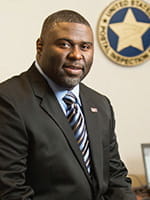One graduate shares his expertise.

Dr. Gregory Campbell.
Photo credit:
Bruce Benet.
Dr. Gregory Campbell ’12 | PhD in Management
When it comes to fraud, knowledge is power. “Scams have been around for years. What’s changed is technology,” says Dr. Gregory Campbell, deputy chief inspector of Western Field Operations for the U.S. Postal Inspection Service. “The Internet has allowed scams to expand and become more complex. Ultimately, it’s created a borderless, global arena in which we investigate crimes.” Campbell knows this personally; his niece was a target.
After befriending her on a dating site, a scammer asked Campbell’s niece to deposit his check for $45,000 into her bank account and wire him $20,000 to aid a sick relative. The scammer promised her the remaining $25,000. Fortunately, the bank alerted her father that the check was counterfeit before the transaction was complete. “The lure to accept the offer is so strong,” Campbell says, “especially with the economic downturn, the elderly on fixed incomes, and college students trying to live on their own.” Here, he offers tips for spotting and reporting fraud.
IS IT TOO GOOD TO BE TRUE? IT IS. I know it’s a cliché, but listen to your sixth sense when something seems too easy. Scammers take advantage of generational susceptibilities: baby boomers and the elderly who grew up when a handshake or someone’s word was a bond and college students who trust people via social networking. If an ad promises thousands of dollars while working from home, why isn’t everyone doing it? If you’re notified that you’ve won the lottery in a country you’ve never visited, don’t bite.
MOVE SLOWLY. Scammers try to make you act quickly to capitalize on banking industry regulations regarding the time required for checks to clear. Be cautious when wiring money to someone you don’t know personally or have only met online.
NEVER GIVE PERSONAL INFORMATION OVER THE INTERNET. For example, don’t click on a link in an email supposedly from a financial institution. Instead, go to the bank’s website to determine whether the institution really does require your information. Or call the bank and ask about the email request to verify it is not a scam.
BE BOLD. COME FORWARD. Criminals prey on susceptibility and guilt. One reason these crimes are so terrible is that victims are embarrassed, ashamed, or afraid to share their stories. Don’t be. Talk to family members, a caregiver, a local police department, or the Postal Inspection Service if you fear you’ve been scammed. If you are solicited, call the Better Business Bureau to verify with whom you’ve spoken and the legitimacy of the business. The more the public knows, the safer we’ll all be.
Learn more at deliveringtrust.com.



